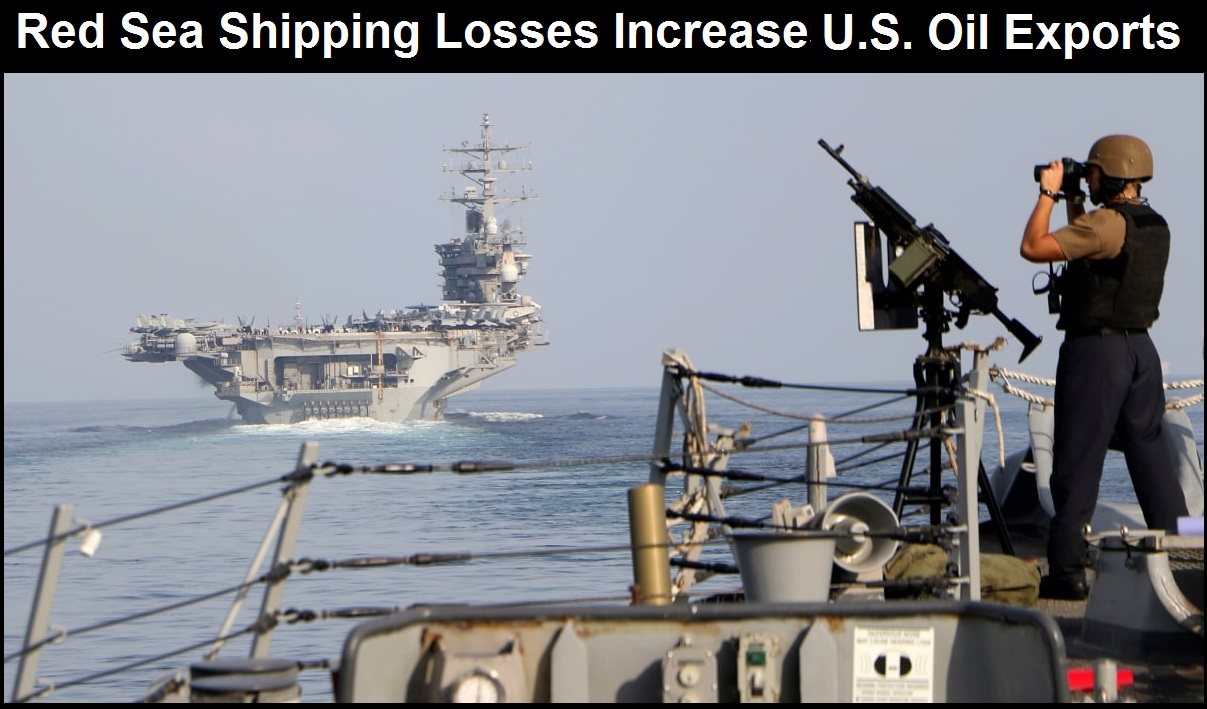by Brian Shilhavy, Health Impact News:

A headline earlier this week stated that ships were still not passing through the Red Sea as “Biden’s Operation Prosperity Guardian Fails.” (Source.)
In an article I published on December 23rd, I speculated that the Red Sea shipping disruptions might actually benefit the U.S., which might be one reason why the U.S. has not taken much action to open up the shipping lanes in the Red Sea:
TRUTH LIVES on at https://sgtreport.tv/
Most of the oil that flows through the Red Sea is oil that is on its way to Europe, which may explain why the U.S. has taken so long to respond to the Houthis’ attacks on ships in the Red Sea, since the disruptions of commerce there may actually benefit the U.S. (Full article.)
It appears that I was correct, as it was reported today in the financial news that U.S. petroleum exports have climbed by 1.377 million barrels A DAY since the Houthi attacks in the Red Sea.
Why Red Sea chaos is driving oil buyers ‘into the arms of U.S. shale producers’
Middle East transport woes could push U.S. crude exports to record: analyst
Attacks by Iran-backed Houthi rebels on vessels in the Red Sea have led to transport disruptions for oil and other goods, but international oil shippers may have found a way to deal with the chaos.
The latest data from the Energy Information Administration offers a hint to that solution.
The report from the government agency showed surprisingly large weekly increases in gasoline and distillate supplies, contributing to losses for energy futures on Thursday.
But Robert Yawger, executive director for energy futures at Mizuho Securities USA, also highlighted another key figure in the data — a weekly jump in U.S. petroleum exports.
Exports climbed by 1.377 million barrels a day to 5.292 million barrels a day for the week ended Dec. 29, according to the EIA.
“For the first time since Houthi Yemeni rebels started to attack international shipping in the Red Sea, we are seeing a spike in U.S. exports,” said Yawger, in a Thursday afternoon note.
“Apparently, international shippers are worried about being attacked on the open sea, and are getting beat” on the cost of sailing around the Cape of Good Hope in South Africa as an alternative to the passage through the Red Sea, he said. Instead, the “safer and cheaper way to procure supply, especially for EU customers, is to sail the boat to the U.S. Gulf Coast and load up on cheap U.S. [oil] barrels.” (Source.)
Will this news finally wake up European countries to the fact that these U.S.-led wars are destroying their economy as the U.S. prospers from these wars?
The Ukraine – Russian war literally turned off the pipeline to Europe’s cheapest natural gas sources from Russia, including blowing up one of those pipelines, which greatly benefited the U.S. as they are now the world’s largest exporter of natural gas.
This was just published yesterday:
US Crowned World’s Top LNG Exporter
The United States has become the world’s largest exporter of liquefied natural gas, surpassing Qatar and Australia for the first time.
The US surpassed Qatar, previously crowded ‘king of LNG exporters’ in 2022 after export volumes dropped for the first time since 2016 by 1.9%. Australia ranked second.
Most US LNG exports depart from terminals across the Gulf Coast with top destinations in the Netherlands, the UK, and France for the first half of 2023.
The US only joined the LNG export scene in 2016 amid an abundance of shale gas and growing demand for gas globally.
More than a year later, the US stands as the largest beneficiary of the destruction of Russia’s Nord Stream pipeline system under the Baltic Sea to Europe. (Source.)
There is also ample evidence that the Israeli – Hamas war is first and foremost a war about the natural gas reserves in the Mediterranean Sea off the coast of Gaza.
Is the Israeli – Palestinian War Really a Religious War, or a War to Control Petroleum and Gas in the Middle East?

The Biden Administration is facing increasing pressure to do something about the Houthis of Yemen and open up the sea lanes in the Red Sea.
As Houthis Threaten To Sink Biden’s Reelection Chances, White House Belatedly Draws Up Options To Attack
Several officials who spoke to Politico say that the Biden administration is drawing up military response options as the Gaza war is threatening to expand into a broader regional conflagration. After months of Yemen’s Iran-backed Houthis taking potshots at Israel as well as commercial (and military!) vessels in the Red Sea with impunity, the Pentagon could finally hit back—but only after admin officials have become worried over the impact that “doing nothing” would have on the upcoming November election. (Source.)
But even if the U.S. military does start operations in the Red Sea that also attack positions inside Yemen, such a conflict could go on for a long time, and the U.S. could certainly suffer casualties as the blood of American Navy members spill into the Red Sea, all in the name of protecting (and EXPANDING) the U.S. petroleum market and the crumbling Rockefeller Empire.
Read More @ HealthImpactNews.com




